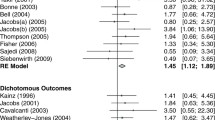Abstract
Subjective probabilities play a significant role in the assessment of evidence: in other words, our background knowledge, or pre-trial beliefs, cannot be set aside when new evidence is being evaluated. Focusing on homeopathy, this paper investigates the nature of pre-trial beliefs in clinical trials. It asks whether pre-trial beliefs of the sort normally held only by those who are sympathetic to homeopathy can legitimately be disregarded in those trials. The paper addresses several surprisingly unsuccessful attempts to provide a satisfactory justification for ignoring the pre-trial beliefs of the homeopathic community. The ensuing diagnosis of the difficulties here emphasizes that the reason the arguments for choosing the pre-trial beliefs of the conventional community seem insufficient is not the arguments per se. It is rather that there is no cogent argument for choosing the conventional stance which would at the same time rationally persuade a member of the homeopathic community. The paper concludes that, once we understand that this is the predicament, there is no genuine reason to doubt the reasoning that leads us to reject the pre-trial beliefs of the homeopathic community.
Similar content being viewed by others
Notes
Singh (2008) gives a thorough overview of the controversy.
A classic study setting out the role of pre-trial belief is “Biased assimilation and attitude polarization: the effect of prior theories on subsequently considered evidence” (Lord et al. 1979).
Also, in, for example, frequentist statistical evaluations of clinical trials pre-trial beliefs have to be considered. Here the researcher’s belief that the 0-hypothesis is true cannot be neglected. That is, if one’s pre-trial beliefs about the effect of a given treatment are very low, there could be reason to reject even a statistically significant result on the grounds that one suspects it to be a result of chance findings (Hróbjartsson 2002).
Though of course we are aware that there are presumably many different pre-trial beliefs at stake both inside the homeopathy community as well as the conventional community. However, in this context we will only regard the two overall sets of pre-trial beliefs—the homeopathy community and the conventional community.
Though, of course, it is obvious that if numerous trials were to produce positive evidence for an effect of homeopathy, this would continuously change the pre-trial beliefs and raise the prior probability, and eventually also the posterior probability, of the treatment being effective. However, this is not the case in homeopathy, where numerous trials have been negative.
We are aware of the well-known fact that many conventional treatments have not been evaluated rigorously. However, there are good reasons why not all conventional treatments have been tested. First, it would be extremely expensive to do so; and second, and more important, it is not obvious that it would be ethically acceptable to do so. For at more elaborate discussion on the question of whether the fact that not all conventional medicine have been tested rigorously constitute an argument for the lowering the standards of evidence for alternative medicine see (Hansen and Kappel 2010).
References
Ernst, E. 2002. A systematic review of systematic reviews of homeopathy. British Journal of Clinical Pharmacology 54: 577–582.
Hansen, K., and K. Kappel. 2010. The proper role of evidence in complementary and alternative medicine. Journal of Medicine and Philosophy 35: 1.
Hróbjartsson, A., and S. Brorson. 2002. Interpreting results from randomized clinical trials. In The role of complementary & alternative medicine, ed. D. Callahan. Washington, DC: Georgetown University Press.
Hume, D. 1902. Section X, part 1 ‘Of Miracles’. In An enquiry concerning human understanding, ed. L.A. Selby-Bigge. London: Oxford University Press.
Linde, K., N. Clausius, G. Ramirez, D. Melchart, F. Eitel, et al. 1997. Are the clinical effects of homeopathy placebo effects? A meta-analysis of placebo-controlled trials. The Lancet 350(9081): 834–843.
Linde, K., M. Scholz, G. Ramirez, N. Clausius, D. Melchart, and W.B. Jonas. 1999. Impact of study quality on outcome in placebo-controlled trials of homeopathy. Journal of Clinical Epidemiology 52(7): 631–636.
Lord, C.G., L. Ross, and M.R. Lepper. 1979. Biased assimilation and attitude polarization: The effects of prior theories on subsequently considered evidence. Journal of Personality and Social Psychology 37(11): 2098–2109.
Kuhn, T. 1977. The essential tension: Selected studies in scientific tradition and change. Chicago: University of Chicago Press.
Rawls, J. 1996. Political liberalism. New York: Columbia University Press.
Salmon, W.C. 1998. Rationality and objectivity in science or Tom Kuhn meets Tom Bayes. In Philosophy of science. The central issues, ed. M. Curd, and J.A. Cover. New York: W. W. Norton & Company.
Shang, A., K. Huwiler-Muntener, L. Nartey, P. Juni, S. Dorig, et al. 2005. Are the clinical effect of homeopathy placebo effects? Comparative study of placebo-controlled trials of homeopathy and allopathy. The Lancet 366(9487): 726–732.
Shimony, A. 1970. Scientific inference. In The nature and function of scientific theories, ed. R.G. Colodny, 79–172. Pittsburgh: University of Pittsburgh Press.
Singh, S., and E. Ernst. 2008. Trick or treatment? Alternative medicine on trial. London: Bantam Press.
Skrabanek, P. 1986. Demarcation of the absurd. The Lancet, April 26.
Strevens, M. 2006. Bayesian approach to philosophy of science. In Encyclopedia of philosophy, 2nd ed. D.M. Borchert. Detroit: Macmillan Reference USA.
Vickers, A.J. 2000. Clinical trials of homeopathy and placebo: Analysis of a scientific debate. The Journal of Alternative and Complementary Medicine 6(1): 49–56.
Acknowledgments
We wish to thank Paul Robinson for improving our English and giving editorial advice.
Author information
Authors and Affiliations
Corresponding author
Rights and permissions
About this article
Cite this article
Hansen, K., Kappel, K. Pre-trial beliefs in complementary and alternative medicine: whose pre-trial belief should be considered?. Med Health Care and Philos 15, 15–21 (2012). https://doi.org/10.1007/s11019-010-9279-7
Published:
Issue Date:
DOI: https://doi.org/10.1007/s11019-010-9279-7




